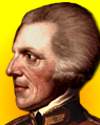
On 26 Mar 1753, Benjamin Thompson was born in colonial America, later to become known as Count Rumford. Today’s feature is a chapter from Leading American Men of Science (1910). That he should have a presence in a book of that title is ironic, because he was a soldier of fortune, served in the British army during the time of the American revolution, and fled to England after the fall of Boston.
For science in Britain, that was fortunate, for Rumford was, according to this biography, “another Franklin.” He was an inventive and diligent scientist, who assisted Joseph Banks in the founding of the Royal Institution in London.
But, judge him for yourself after, reading this substantial feature on Benjamin Thompson, Count Rumford.

On 26 Mar 1941, Richard Dawkins was born, English evolutionary biologist and science writer known for his outspoken, but intellectual opinions. His books include international best-sellers, now classics. Today's book pick is: The Selfish Gene: 30th Anniversary Edition--with a new Introduction by the Author, by Richard Dawkins. In this book, though he credits Charles Darwin as being the “founder of really everything that I do,” Dawkins reformulates the theory of natural selection. He has the rare distinction of having provoked as much excitement and interest outside the scientific community as within it. His theories have helped change the whole nature of the study of social biology, and have forced thousands of readers to rethink their beliefs about life. Dawkins explains how the selfish gene can also be a subtle gene. The world of the selfish gene revolves around savage competition, ruthless exploitation, and deceit, and yet, Dawkins argues, acts of apparent altruism do exist in nature. Bees, for example, will commit suicide when they sting to protect the hive, and birds will risk their lives to warn the flock of an approaching hawk.
It is available from Amazon, typically about New from $19.95. Used from $1.42. (As of earlier time of writing - subject to change.)
 | A conceptual scheme is never discarded merely because of a few stubborn facts with which it cannot be reconciled; a conceptual scheme is either modified or replaced by a better one, never abandoned with nothing left to take its place. |
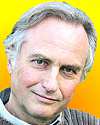 | DNA neither cares nor knows. DNA just is. And we dance to its music. |
 | Every human activity, good or bad, except mathematics, must come to an end. |
| Before you look at today's web page, see if you can answer some of these questions about the events that happened on this day. Some of the names are very familiar. Others will likely stump you. Tickle your curiosity with these questions, then check your answers on today's web page. | |
| Births | |
 | Benjamin Thompson Rumford, born 26 Mar 1753, was an American-born British physicist whose investigations of heat overturned the prevailing theory and established the beginnings of the modern theory that heat is a form of motion. (He invented a double boiler, a kitchen stove and a drip coffee pot.) What was the theory of heat Rumford replaced? |
| Deaths | |
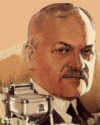 | Fred L. Maytag (1857-1937) started a farm implement company in Newton, Iowa, with three other men in 1893. Sales of their products experienced seasonal slumps, so in 1907, the company started to built a sideline product for sale outside of the farm implement line. What was the sideline product Maytag's company introduced in 1907? |
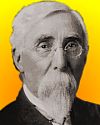 | Henry Martyn Leland (1843-1932) founded a company to build an automobile on 22 Aug 1902, the first automobile with high-precision, fully-interchangeable parts. Even though he eventually sold the business to another automobile manufacturer, the brand name of Leland’s car remains on current product line. What was the brand name that Leland introduced? |
| Events | |
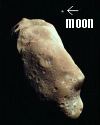 | On 26 Mar 1994, a picture was released of a newly-discovered moon named Dactyl. It was imaged by NASA’s Galileo spacecraft, on 28 Aug 1993. As a moon, Dactyl was the first of its kind. What is extraordinary about this moon? |
 | On 26 Mar 1953, a new vaccine to immunize people against polio was announced. What is the name of the researcher who developed this new polio vaccine? |
Fast answers for the previous newsletter for March 25: The planet Jupiter • agricultural technological advance to improve crop yields that promised to alleviate world hunger • coal-tar oil • the decade including the year 1954 • Pierre and Marie Curie.
 If you enjoy this newsletter, the website, or wish to offer encouragement or ideas, please send feedback by using your mail reader Reply button.
If you enjoy this newsletter, the website, or wish to offer encouragement or ideas, please send feedback by using your mail reader Reply button. Your click on a Facebook, StumbleUpon, or other social button on the site webpages is also a welcome sign of appreciation. Thank you for using them.
© This newsletter is copyright 2020 by todayinsci.com. Please respect the Webmaster's wishes and do not put copies online of the Newsletter — or any Today in Science History webpage. (If you already have done so, please remove them. Thank you.) Offline use in education is encouraged such as a printout on a bulletin board, or projected for classroom viewing. Online, descriptive links to our pages are welcomed, as these will provide a reader with the most recent revisions, additions and/or corrections of a webpage. For any other copyright questions, please contact the Webmaster by using your mail reader Reply button.
--
If you do not want to receive any more newsletters, Unsubscribe
To update your preferences and to unsubscribe visit this link
Executive Real Estate Business Class
-
"It was like a man with wings. It wasn't like anything you'd see on TV or in a monster movie." ...
About the publisher
Search This Blog
Blog Archive
-
▼
2021
(585)
-
▼
March
(44)
- Newsletter for Wednesday 31 March.
- On This Day for March 30 - Failed assassination at...
- Newsletter for Tuesday 30 March.
- On This Day for March 29 - Dominion of Canada crea...
- Newsletter for Monday 29 March.
- The real history behind new film 'Ammonite', starr...
- On This Day for March 28 - Constantinople renamed ...
- Newsletter for Sunday 28 March.
- On This Day for March 27 - Cleopatra reinstated as...
- Newsletter for Saturday 27 March.
- Catch a break with spring savings
- On This Day for March 26 - Signing of Israel-Egypt...
- Newsletter for Friday 26 March.
- On This Day for March 25 - Robert the Bruce crowne...
- On This Day for March 24 - Exxon Valdez Alaskan oi...
- Newsletter for Wednesday 24 March.
- On This Day for March 23 - Lewis and Clark's retur...
- Newsletter for Tuesday 23 March.
- On This Day for March 22 - Murder at Jamestown, Ya...
- Newsletter for Monday 22 March.
- Roman medicine: 6 ways people stayed healthy
- On This Day for March 21 - Closing of Alcatraz pri...
- Newsletter for Sunday 21 March.
- On This Day for March 20 - AUM subway attack, Maud...
- Newsletter for Saturday 20 March.
- On This Day for March 19 - Iraq War begins, Glenn ...
- Newsletter for Friday 19 March.
- On This Day for March 18 - Election of Chen Shui-b...
- On This Day for March 17 - Vote to end apartheid, ...
- On This Day for March 16 - My Lai Massacre, Caroli...
- On This Day for March 15 - Julius Caesar assassina...
- On This Day for March 14 - Reelection of Vladimir ...
- Newsletter for Sunday 14 March.
- On This Day for March 13 - The planet Uranus disco...
- Newsletter for Saturday 13 March.
- Newsletter for Friday 12 March.
- Newsletter for Thursday 11 March.
- Newsletter for Wednesday 10 March.
- On This Day for March 9 - Battle of the Monitor an...
- Newsletter for Monday 8 March.
- Newsletter for Sunday 7 March.
- On This Day for March 6 - King Tut's tomb opened, ...
- On This Day for March 2 - Moroccan independence de...
- On This Day for March 1 - Establishment of Yellows...
-
▼
March
(44)
-
Blogroll
-
About
HistoryFact










0 comments:
Post a Comment